This blog will review some of the leading cross-chain liquidity providers that facilitate the transfer of assets across multiple blockchains.
We will examine platforms that provide high liquidity, minimal costs, and stringent security, enabling traders and DeFi users to perform efficient cross-chain swaps.
It is essential to understand the providers as they serve varying purposes for smooth and reliable multi-chain transactions.
How To Choose the Best Cross-Chain Liquidity Providers
Supported Chains & Ecosystems:
- Evaluate whether the provider covers the most frequently used blockchains.
- Confirm whether it covers Ethereum plus Layer 2 solutions if necessary.
- Prioritize providers with expanding networks to future-proof your operations.
Liquidity Depth & Speed:
- More liquidity means less slippage on swaps.
- Quicker execution means a shorter wait time and improved trade efficiency.
- Look at historical transaction volume to evaluate liquidity.
Security & Reliablity:
- Use non-custodial systems that operate on decentralized security.
- Look for verification from audits, bug bounty programs, or well-known validator networks.
- Evaluate risk by examining past incidents and potential security breaches.
Transaction Fees:
- Gather information on various providers and compare their fees.
- Determine whether the fees charged are network gas fees only or fees on additional protocol charges.
- For frequent or low-value transfers, lower fees are necessary.
Supported Cryptocurrencies:
- Check the platform and confirm whether it supports the required tokens.
- For increased operations in DeFi multi-token support is preferred.
- Slippage transfers are easier with compatible stablecoins.
Key Points
| Protocol | Key Features |
|---|---|
| Rango Exchange | Aggregates DEXs, bridges, and cross-chain protocols for seamless swaps. |
| Across Protocol | Optimistic oracle-based bridge for Layer 2 solutions. |
| Portal Token Bridge | Powered by Wormhole for fast and secure cross-chain transfers. |
| Orbiter Finance | Enables fast, low-cost asset transfers across Layer 2 networks. |
| Celer cBridge | Offers instant, low-cost asset transfers across multiple chains. |
| Hop Protocol | Decouples bridge settlement from messaging protocol for efficiency. |
| Allbridge | Specializes in stablecoin swaps across EVM and non-EVM blockchains. |
| Connext | Provides fast and secure modular interoperability for cross-chain transfers. |
| THORChain | Facilitates cross-chain swaps without wrapped assets. |
| Defiway | Focuses on decentralized finance solutions with cross-chain capabilities. |
10 Best Cross-Chain Liquidity Providers
1. Rango Exchange
In August 2021, Vahid Kaya, along with other co-founders, started Rango Exchange, a top liquidity provider offering cross-chain liquidity swaps on over 75 blockchains. With over 106+ DEXs, 26+ bridges
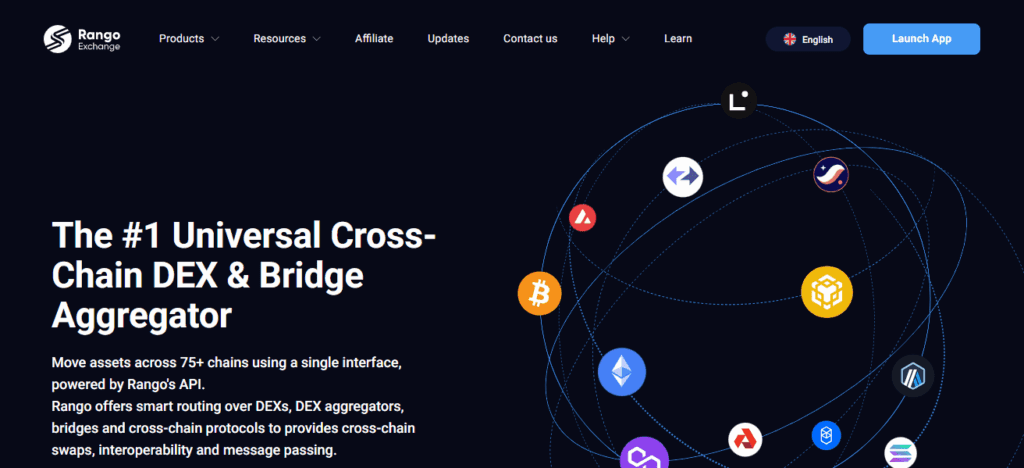
Ethereum, Solana, Bitcoin, and Cosmos are among the supported tokens, and Rango Exchange also incorporates smart routing to ensure optimal fees and high liquidity.
It is a non-custodial platform and does not charge Rango is supported by Binance Labs and serves more than 1.66 million users and wallets.
| Feature | Details |
|---|---|
| Launched | 2021 |
| Founder(s) | Not publicly disclosed |
| Supported Chains | 75+ chains including Ethereum, Arbitrum, Polygon, Solana, BNB Chain, Avalanche, and more |
| Liquidity Model | Aggregates liquidity from DEXs, bridges, and cross-chain protocols |
| Security | Non-custodial with smart routing and integration with multiple liquidity sources |
| Transaction Fees | Varies based on the route and networks involved; typically covers base layer gas costs |
| Cryptocurrency Support | Supports a wide range of ERC-20 and native tokens across multiple chains |
2. Across Protocol
Launched on October 24, 2021, Across Protocol enabled transfers across different Ethereum Layer 2s like Arbitrum, Optimism, and Polygon, employing a permissionless decentralized cross-chain bridge designed for efficient and secure asset transfers.
The Protocol developed a proprietary liquidity model composed of a single liquidity pool and a decentralized network of relayers for cost-efficient and rapid transactions. Security is enhanced through fraud-proof transactions enabled by UMA’s optimistic oracle.
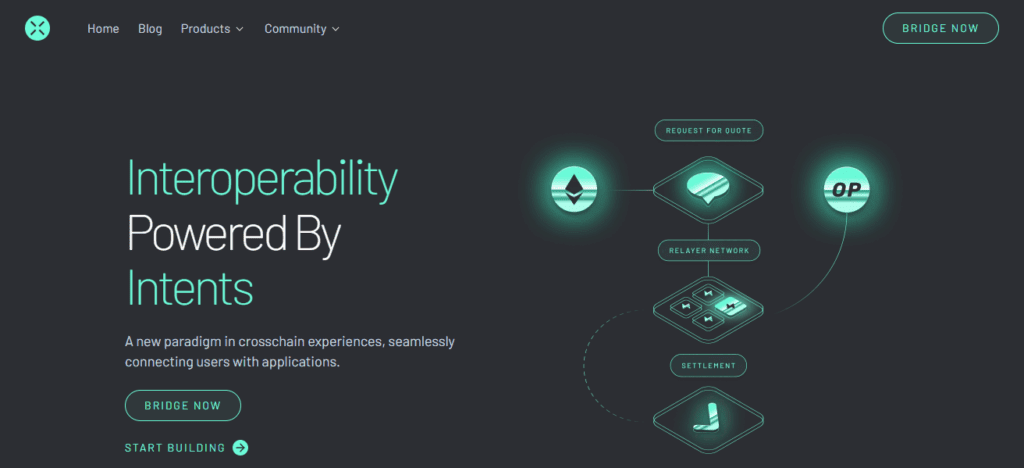
Users of Across Protocol incur minimal transaction fees, only paying base layer gas costs. Across Protocol also offers several other ERC-20 tokens to the market, broadening the spectrum of DeFi interoperability tools.
| Feature | Details |
|---|---|
| Launched | Not publicly disclosed |
| Founder(s) | Not publicly disclosed |
| Supported Chains | Ethereum, Arbitrum, Optimism, Polygon, Base, and more |
| Liquidity Model | Utilizes relayers for asset transfers, focusing on gas efficiency |
| Security | Decentralized relayer network ensuring trustless transfers |
| Transaction Fees | Optimized for low gas costs, with fees typically under $1 |
| Cryptocurrency Support | Primarily supports Ethereum-native assets |
3. Portal Token Bridge
The Portal Token Bridge is a decentralized cross-chain token bridge built in 2022 and supported by the Wormhole protocol.
It allows users to safely and smoothly move assets to and from a growing list of 20+ supported blockchains, including Ethereum, Solana, Binance Smart Chain, Polygon, Aptos, and more.
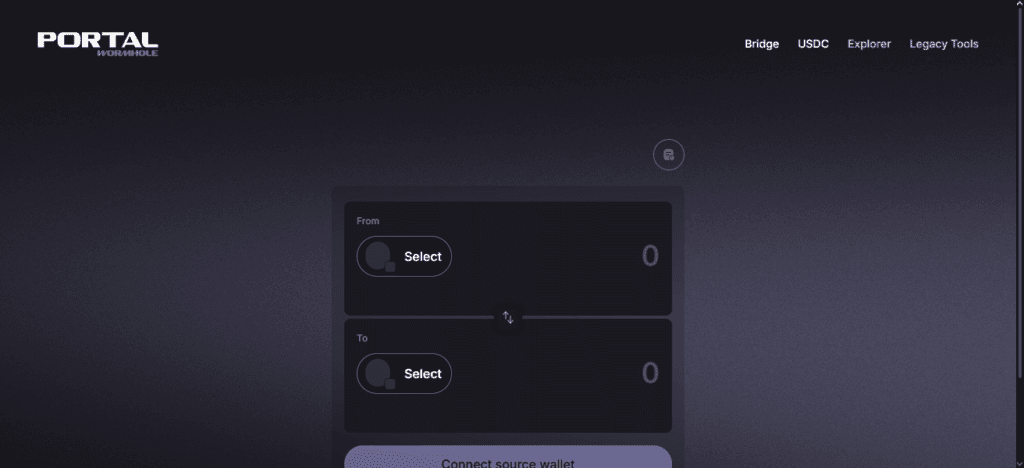
The Portal Bridge uses a Lock and Mint process to complete transactions, meaning a set number of tokens are locked and corresponding minted tokens are created on the destination chain.
Security is provided by Wormhole’s Guardian Network, a decentralized cluster of users that verifies and attests cross-chain messages.
Fee costs are very low as users typically only pay the base gas fees. Portal supports many ERC-20 and SPL tokens, enabling the seamless flow of assets and interoperability between different blockchain networks.
| Feature | Details |
|---|---|
| Launched | Not publicly disclosed |
| Founder(s) | Not publicly disclosed |
| Supported Chains | Multiple chains via Wormhole integration |
| Liquidity Model | Token wrapping using Wormhole for cross-chain transfers |
| Security | Powered by Wormhole, ensuring secure token transfers |
| Transaction Fees | Varies depending on the chains involved; typically covers base layer gas costs |
| Cryptocurrency Support | Supports a wide range of tokens wrapped via Wormhole |
4. Orbiter Finance
Orbiter Finance is one of the first cross-chain bridges to be launched on DeFi ever since April 202,1 and was built by Orbiters Labs. The orbiter finance boasts secure and low cost cross chain asset transfers across 40+ chains such as Ethereum, Arbitrum, zkSync, Solana, Optimism and BNB Chain.
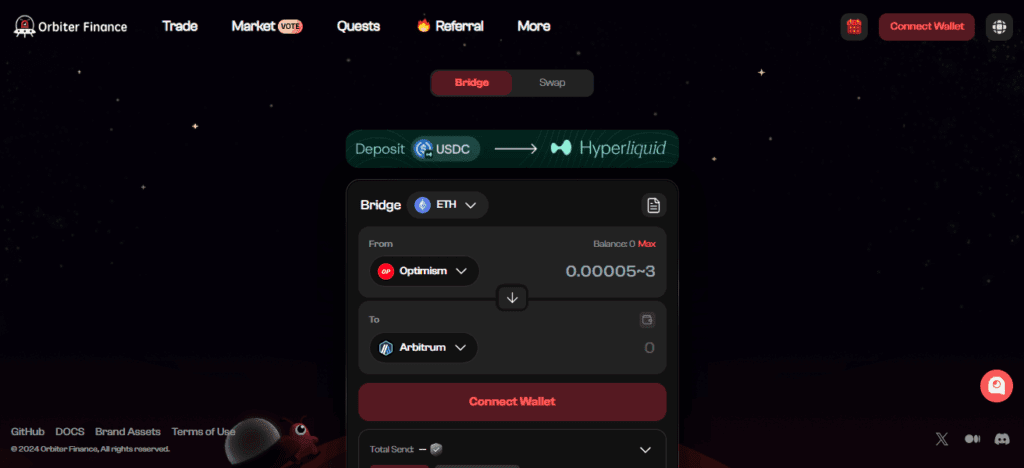
It uses ZK technology and a Maker-Sender Liquidity Model to offer ultra-secure asset transfers with finality under 20 seconds. Rapid finality on the orbiter infrastructure is well protected; the underlying technology guarantees 20 seconds.
Most ERC20 and native tokens can be transferred with low cost or Orbiter finance fees, usually just gas fees. Orbiter’s native governance token, OBT, enables staking, and OBT is used to enhance the protocol.
| Feature | Details |
|---|---|
| Launched | Not publicly disclosed |
| Founder(s) | Not publicly disclosed |
| Supported Chains | Ethereum, zkSync, Arbitrum, Optimism, Polygon, BNB Chain, and more |
| Liquidity Model | Cross-rollup bridging with a Maker mechanism for liquidity provision |
| Security | Utilizes zero-knowledge proofs for secure transactions |
| Transaction Fees | Low-cost transfers with fees varying based on the networks involved |
| Cryptocurrency Support | Supports Ethereum-native assets and tokens across various rollups |
5. Celer cBridge
Celer Network started the non-custodial cross-chain liquidity provider, Celer cBridge, in July 2021. Now, it is one of the biggest decentralized cross-chain liquidity providers with over 40 Ethereum, Arbitrum, BNB Chain, Polygon, Avalanche, Fantom, as well as many other chains.
Cross-chain transfers through their cBridge is secure, fast, and cheap, which uses the hybrid liquidity model with cBridge xAsset and cBridge xLiquidity modes. cBridge uses the robust State Guardian Network (SGN) which keeps the platform secure.
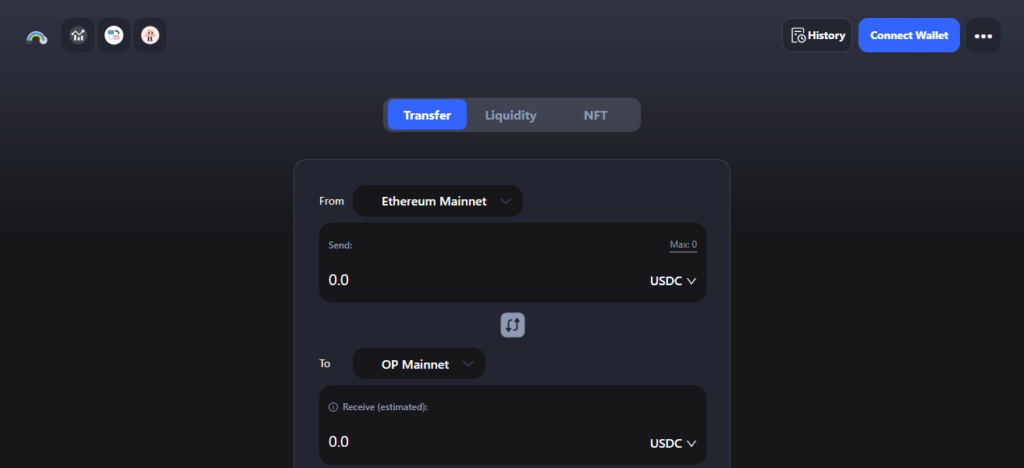
Users’ transaction fees are also extremely cheap, in most cases only the base layer gas fee. Users of cBridge can connect and transfer many supported ERC-20 tokens across various blockchain platforms.
| Feature | Details |
|---|---|
| Launched | July 2021 |
| Founder(s) | Mo Dong and Dr. Junda Liu |
| Supported Chains | 15+ chains including Ethereum, Arbitrum, BNB Chain, Polygon, Avalanche, and more |
| Liquidity Model | Hybrid liquidity model combining xAsset and xLiquidity modes |
| Security | Secured by the State Guardian Network (SGN) |
| Transaction Fees | Low fees, typically covering only base layer gas costs |
| Cryptocurrency Support | Supports a wide range of ERC-20 tokens |
6. Hop Protocol
Launched on July 12, 2021, by Shane Fontaine, Miguel Mota, and Christopher Whinfrey, Hop Protocol is a decentralized cross-chain liquidity provider that allows cheap and fast transfers to and from Ethereum Layer 2s and Sidechains like Arbitrum, Optimism, Polygon, and Gnosis.
Using a unique liquidity model, Hop allows instant transfers through the use of “hTokens,” which are tokens that represent assets that are locked on source chains, thus eliminating the need to wait for challenge periods.
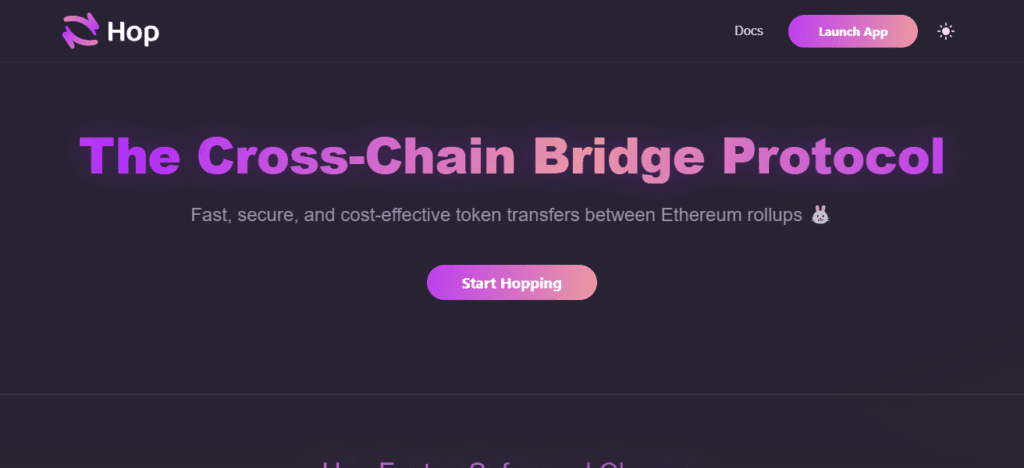
Security is guaranteed by the decentralized network of bonders that provide liquidity and serve as hop token redeem agents.
Fees are low and usually only the base layer gas costs are incurred. Hop has a large range of supported ERC-20 tokens which enhances DeFi interoperability across other chains and ecosystems.
| Feature | Details |
|---|---|
| Launched | July 2021 |
| Founder(s) | Shane Fontaine, Miguel Mota, and Christopher Whinfrey |
| Supported Chains | Ethereum, Arbitrum, Optimism, Polygon, and more |
| Liquidity Model | Utilizes hTokens for fast, low-fee transfers between Layer 2 solutions |
| Security | Decentralized network of bonders ensuring secure transfers |
| Transaction Fees | Minimal fees, primarily covering base layer gas costs |
| Cryptocurrency Support | Supports a wide range of ERC-20 tokens |
7. Allbridge
Started on the 1st of July 2021 by the two founders, Yuriy Savchenko and Andriy Velykyy, Allbridge is a decentralized cross-chain liquidity provider.
While it initially concentrated on bridging Solana to other blockchains, it now supports over 20 other networks, such as Ethereum, Polygon, BNB Chain, Tron, and even Stellar.
Allbridge facilitates two main products: Allbridge Classic, which allows cross-chain wrapped token transfers, and Allbridge Core, which was released in September 2022.
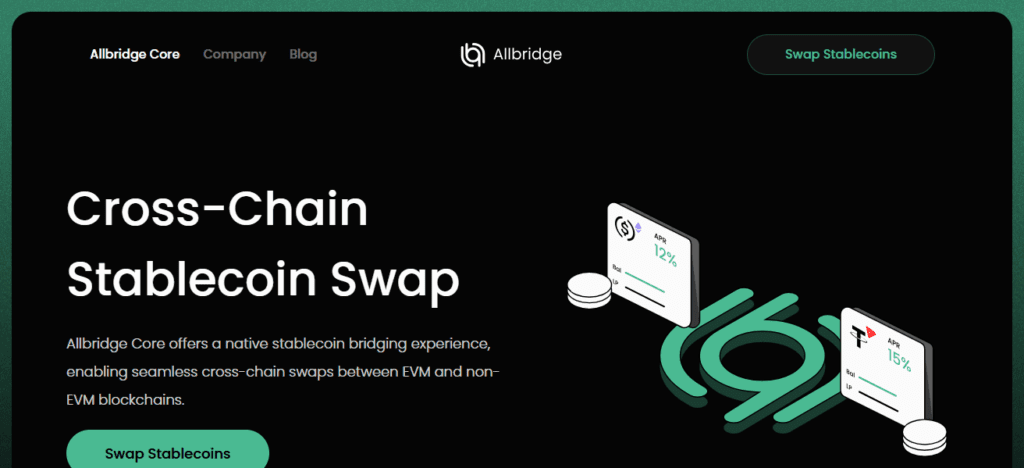
Allbridge Core enables the cross-chain remote and local stablecoin swaps without the wrapping of tokens across EVM and non-EVM chains.
To aid in the efficient and secure transfers, the platform uses messaging protocols like the Wormhole and Circle’s Cross Chain Transfer Protocol (CCTP). Allbridge offers competitive transaction fees and supports a vast array of cryptocurrencies, with a primary focus on stablecoins.
| Feature | Details |
|---|---|
| Launched | July 2021 |
| Founder(s) | Yuriy Savchenko and Andriy Velykyy |
| Supported Chains | Over 20 chains including Ethereum, Solana, BNB Chain, Tron, and more |
| Liquidity Model | Two products: Allbridge Classic for wrapped token transfers and Allbridge Core for native stablecoin swaps |
| Security | Utilizes messaging protocols like Wormhole and Circle’s CCTP for secure transfers |
| Transaction Fees | Competitive fees, typically covering only base layer gas costs |
| Cryptocurrency Support | Supports a wide range of cryptocurrencies, primarily focusing on stablecoins |
8. Connext
Connext was founded in 2017 by Arjun Bhuptani, Layne Haber, and Rahul Sethuram. Since then the company has dedicated itself toward decentralizing cross chain liquidity. With Connext, cross chain and cross chain smart contracts within Ethereum compatible systems can be done easily and fast with little trust.
Connext utilizes the Network of Off-Chain Routers (NXTP) and a non-custodial cross-chain protocol to secure and unlock funds, eliminating the need to trust third-party validators.
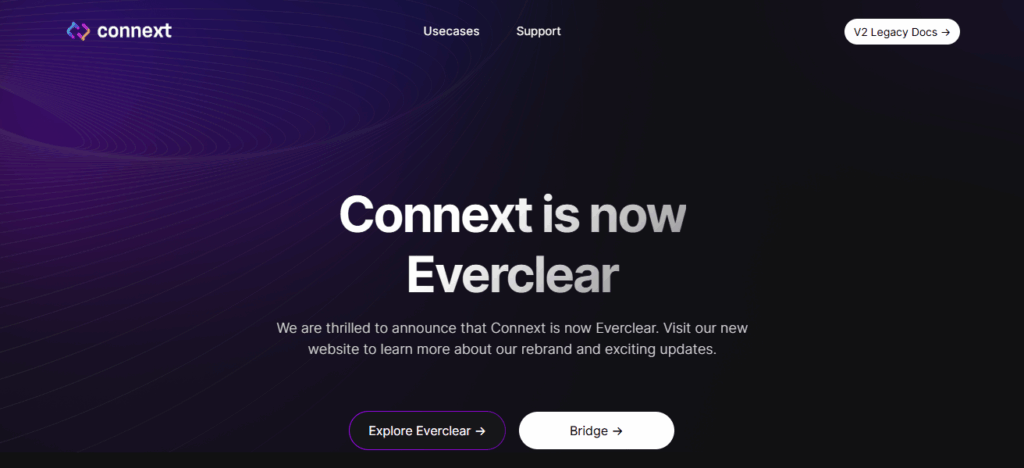
The protocol helps over 20 different chains, including Ethereum, Arbitrum, Optimism, Polygon, Avalanche, and BNB Chain. Transaction fees for Connext are less than the base layer gas fees. For easier relatability, Connext accompanies many ERC-20 tokens, allowing easy transition between blockchains.
| Feature | Details |
|---|---|
| Launched | 2017 |
| Founder(s) | Arjun Bhuptani, Layne Haber, and Rahul Sethuram |
| Supported Chains | Over 20 chains including Ethereum, Arbitrum, Optimism, Polygon, and more |
| Liquidity Model | Non-Custodial Cross-Chain Transfer Protocol (NXTP) utilizing off-chain routers |
| Security | Decentralized network of routers ensuring secure transfers |
| Transaction Fees | Minimal fees, typically covering only base layer gas costs |
| Cryptocurrency Support | Supports a wide range of ERC-20 tokens |
9.ThorChain
Launched in 2018, THORChain is a decentralized, non-custodial, cross-chain liquidity protocol. Unlike a traditional bridge, THORChain allows users to swap native assets across different chains (e.g. BTC, ETH) without needing any wrapped tokens.
It also follows a Continuous Liquidity Pool (CLP) protocol in which trades are made with its native token, RUNE, to secure liquidity pools. Users are also able to maintain security with cross-chain transactions with bonded RUNE tokens which node operators hold.
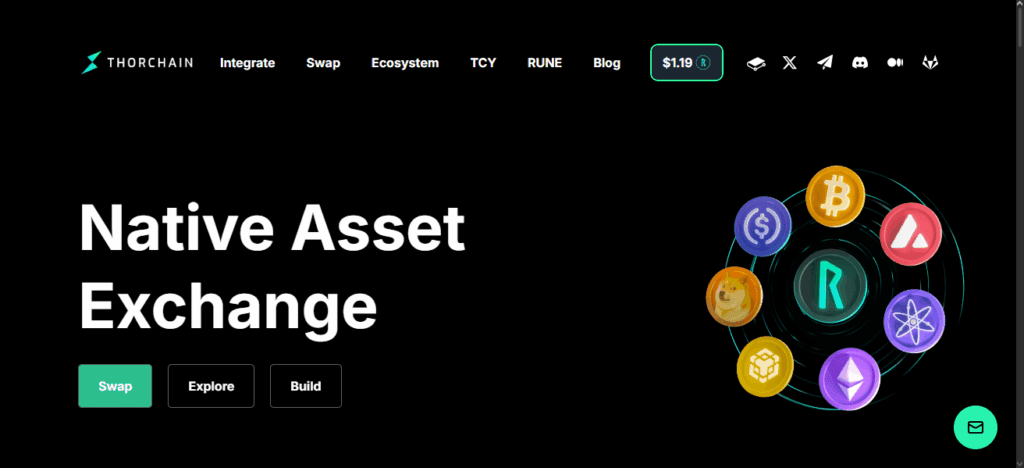
Dynamic fees range from 0.05% to 0.5% and are based on liquidity demand and slippage. Cryptocurrencies supported range from Bitcoin, Ether, and Litecoins, to BNB Chain and a variety of other coins.
| Feature | Details |
|---|---|
| Launched | 2018 |
| Founder(s) | Not publicly disclosed |
| Supported Chains | Bitcoin, Ethereum, BNB Chain, Litecoin, and more |
| Liquidity Model | Continuous Liquidity Pool (CLP) model utilizing native assets and RUNE token |
| Security | Secured by node operators who bond RUNE tokens |
| Transaction Fees | Dynamic fees based on liquidity demand and slippage |
| Cryptocurrency Support | Supports a wide range of cryptocurrencies including BTC, ETH, BNB, and LTC |
10.Defiway
Defiway came out in 2023 as a decentralized, cross-chain liquidity provider for more than 10 blockchains like Ethereum, BNB Chain, Polygon, Arbitrum, OPTIMISM, Tron, Solana, Linea, Scroll and TON.
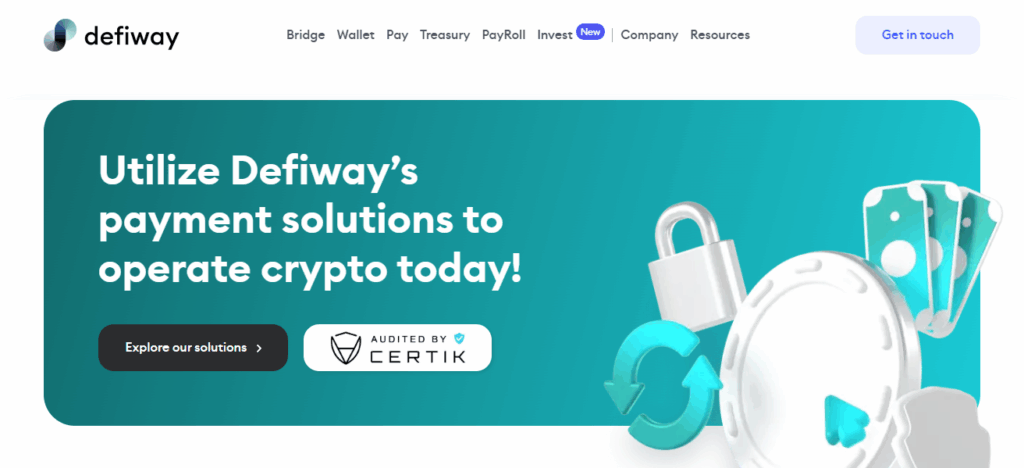
Defiway utilizes a bridge for decentralized cross-chain transactions with no intermediaries, which enhances security and trustlessness.
With no hidden charges, every transaction has a fixed fee of 0.2% which makes Defiway an affordable option. It also offers USDT, USDC, WBTC, ETH and other cryptocurrencies which makes it easy to cross different blockchain ecosystems.
| Feature | Details |
|---|---|
| Launched | 2023 |
| Founder(s) | Not publicly disclosed |
| Supported Chains | Over 10 chains including Ethereum, BNB Chain, Polygon, Arbitrum, Optimism, Tron, Solana, Linea, Scroll, and TON |
Conclsuion
In conclsuion Determining the best cross-chain liquidity provider is a balance of security, supported chains, liquidity, fees, and token compatibility.
Rango Exchange and Celer cBridge and THORChain and Hop Protocol all provide strong, seamless, low-cost, secure cross-chain transfer services.
Combining the key features of all the platforms ensures effective interoperability and trading across various blockchains.
FAQ
It’s a platform that enables asset swaps or transfers between different blockchains, ensuring liquidity and reducing slippage.
Non-custodial and audited platforms with decentralized security are generally safer, but all carry some network and smart contract risks.
Fees vary by protocol and chain; platforms like Hop Protocol and Celer cBridge are optimized for low-cost transfers.












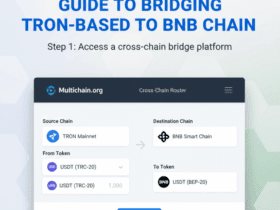

Got a Questions?
Find us on Socials or Contact us and we’ll get back to you as soon as possible.